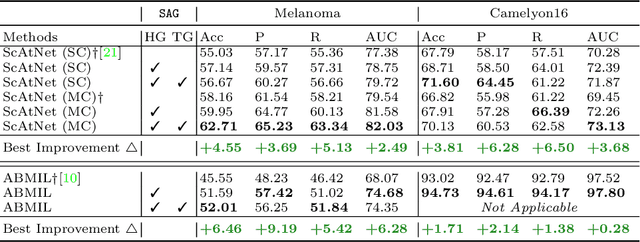Semantics-Aware Attention Guidance for Diagnosing Whole Slide Images
Paper and Code
Apr 16, 2024



Accurate cancer diagnosis remains a critical challenge in digital pathology, largely due to the gigapixel size and complex spatial relationships present in whole slide images. Traditional multiple instance learning (MIL) methods often struggle with these intricacies, especially in preserving the necessary context for accurate diagnosis. In response, we introduce a novel framework named Semantics-Aware Attention Guidance (SAG), which includes 1) a technique for converting diagnostically relevant entities into attention signals, and 2) a flexible attention loss that efficiently integrates various semantically significant information, such as tissue anatomy and cancerous regions. Our experiments on two distinct cancer datasets demonstrate consistent improvements in accuracy, precision, and recall with two state-of-the-art baseline models. Qualitative analysis further reveals that the incorporation of heuristic guidance enables the model to focus on regions critical for diagnosis. SAG is not only effective for the models discussed here, but its adaptability extends to any attention-based diagnostic model. This opens up exciting possibilities for further improving the accuracy and efficiency of cancer diagnostics.
 Add to Chrome
Add to Chrome Add to Firefox
Add to Firefox Add to Edge
Add to Edge